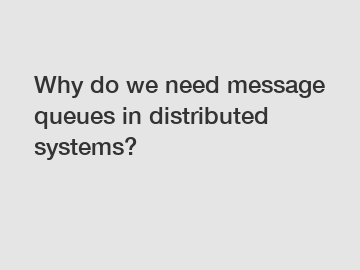Why do we need message queues in distributed systems?
Why do we need message queues in distributed systems?
In today's fast-paced and interconnected world, distributed systems have become a fundamental part of everyday life. They power our social media platforms, enable online shopping, and facilitate seamless communication between remote teams. However, ensuring that these distributed systems run efficiently and reliably can be a complex task. One tool that plays a crucial role in the smooth operation of such systems is the message queue. But what exactly is a message queue, and why do we need it in distributed systems? Let's explore this topic further.
1. Scalability:

Distributed systems often need to handle a large volume of incoming requests, and message queues are designed to handle this scalability challenge. By decoupling the sender and receiver, a message queue allows the system to process messages at its own pace. This ensures that no component gets overwhelmed with a flood of incoming messages, resulting in improved overall performance.
2. Redundancy and fault tolerance:
Message queues help enhance the reliability of distributed systems by providing redundancy and fault tolerance mechanisms. When messages are sent to a message queue, they can be replicated across multiple nodes or servers, ensuring that even if one node fails, the messages are still available for processing. This capability helps prevent data loss and ensures the system remains operational even during failures.
3. Asynchronous communication:
In a distributed system, different components often need to communicate with each other while being loosely coupled. Message queues enable this asynchronous communication by allowing components to send messages to each other without needing an immediate response. This decoupling of communication allows for greater flexibility and adaptability in the system design, making it easier to introduce new components or update existing ones without disrupting the overall system.
4. Load balancing:
Message queues facilitate load balancing in distributed systems by distributing the incoming workload evenly across multiple workers. By utilizing message queues, the system can assign tasks to available workers in a controlled manner, ensuring that no single worker becomes overloaded. This load balancing capability helps maintain system stability, prevents bottlenecks, and optimizes resource utilization.
5. Fault isolation:
In complex distributed systems, failures can occur at any point. Message queues help isolate faults by acting as an intermediary between components. If a component fails or becomes unresponsive, the messages in the queue will remain intact until the component is restored, ensuring that no messages are lost or discarded. This fault isolation mechanism helps to enhance system reliability and minimize the impact of failures on the overall system.
6. Prioritization and ordering:
Message queues allow for prioritizing and ordering the processing of messages. By assigning priorities or timestamps to messages, the system can ensure that critical or time-sensitive messages are processed first. This feature is particularly important in scenarios where different types of messages have varying levels of importance, ensuring that the system operates efficiently and meets the required business needs.
7. Increased fault tolerance during system upgrades:
In a distributed system, upgrading or modifying components can be a challenging task. Message queues provide a layer of fault tolerance during system upgrades as they can keep messages buffered until the upgraded components are ready to process them. This enables smoother upgrades without disrupting ongoing operations, thus reducing downtime and improving overall system availability.
In conclusion, message queues play a critical role in the efficient functioning of distributed systems. Their ability to handle scalability, ensure fault tolerance, enable asynchronous communication, facilitate load balancing, support fault isolation, provide prioritization and ordering, and enhance system upgrades makes them indispensable. By leveraging message queues effectively, organizations can build robust and reliable distributed systems capable of meeting the demands of today's interconnected world. So, the next time you wonder why we need message queues in distributed systems, remember the invaluable benefits they bring to the table.
If you are looking for more details, kindly visit open source message queue, aws slack community, message queue tools.

Comments
0